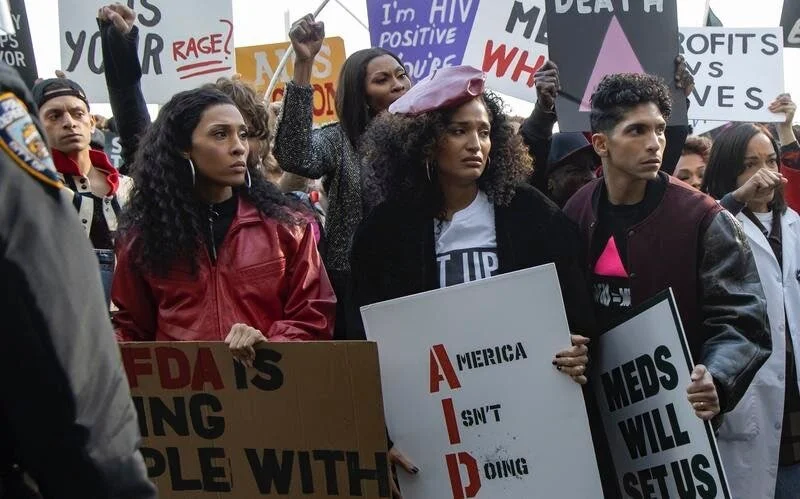The Legacy that “Pose” Leaves Behind with its Finale
The year was 1990. The entire world was “voguing” after the release of Madonna’s chart-topping single “Vogue” and Jennie Livingston’s ballroom documentary Paris is Burning would release to exceptional reviews. For the first time, New York’s underground ballroom culture would bask in this glory. Though mainstream culture would passionately embrace a dance form born in Harlem’s Black and Latino LGBTQ+ ballroom subculture, it would take the better part of three more decades for a meaningful representation of the community to grace our screens in the form of Pose.
Prior to the groundbreaking show’s inception, ballroom culture felt like a distant memory preserved in Livingston’s documentary. Created by Ryan Murphy, Steven Canals, and Brad Falchuk - Pose is unlike anything witnessed in Hollywood before. Even before its release, the show made history by casting five trans women of color in its lead roles. It also hired Janet Mock - the first trans woman of color as a writer in television history and employed a record number of gender diverse people during its run. While most depictions of trans and queer folks in popular media centered on the age-old horrendous tropes that vilified their existence and cis male attraction to them, Pose broke those harmful stereotypes and changed the landscape of trans storytelling forever. Although the critically acclaimed series has bid adieu after its third and final season, the final episode directed by Steven Canals is its magnum opus, leaving an everlasting impact on us.
Set in the backdrop of New York City in the late 1980s and early 1990s, Pose follows the lives of various trans and queer people of color as they navigate the highs and lows of living their lives, and their truths unapologetically. In a quest to leave her mark upon the world following her HIV diagnosis, Blanca Rodriguez-Evangelista (MJ Rodriguez) - a Latina trans woman— establishes the legendary House of Evangelista and begins the lifelong journey of being a caring house mother. In the face of countless adversities; her indomitable spirit, her family, and her community stand strong together for one another. The protagonists of Pose are not your usual side characters whose existences revolve around the storylines of their cisgender counterparts. From the House of Abundance’s extravagant entrance in the “Once Upon a Time” ballroom category, to Angel Evangelista (Indya Moore) and Lil Papi Evangelista’s (Angel Bismark Curiel) historic wedding, to Damon Evangelista (Ryan Jamaal Swain) and Ricky Evangelista (Dyllón Burnside) touring with world-renowned musicians— the characters don’t merely exist. They thrive in the most grandiose way possible.
Angel (Indya Moore) and Papi Evangelista’s (Angel Bismark Curiel) historic wedding | FX Network
The two-hour finale encapsulated the same grandeur that we’ve come to love about the series. Diana Ross’ “Ain’t No Mountain High Enough” blasted in the beloved ballroom hall with a million memories, as Pray Tell (Billy Porter) — the snappy ballroom emcee and godfather to the ballroom community — gloriously lip-synced alongside Blanca for the “Candy’s Sweet Refrain” category. As the ballroom goers soaked up the incandescent and electric spectacle put forth, the judges had no choice but to raise their 10s cards across the board. For most of the season, we saw Pray trying to find closure and making amends with his estranged family and the church as his health deteriorated because of AIDS. Although viewers are slowly clued in to the fact that the night at the ballroom is the last time we’ll see Pray and the vivacious duo in their element; watching Blanca wailing on Ricky’s chest as she learns of Pray’s passing weighs heavy on our souls (seriously, give MJ Rodriguez her long-overdue Emmy). Despite being enrolled in a life-saving AIDS drug trial by the insistence of Blanca and her boyfriend Dr. Christopher (Jeremy Pope), Pray quietly succumbs to the illness. In a selfless act of love and friendship, he sacrifices his life by giving his medication to Ricky. After the surprise death of the queen of defiance - Candy Ferocity (Angelica Ross) in season 2, the void created by Pray Tell’s passing is palpable throughout the episode. But beyond the pain and grief, there is still much to celebrate.
Blanca, Angel and Papi attending an ACT UP protest | FX Network
Pose’s strongest forte and, at times, its greatest enemy, has been its ability to remain conscious of reality while refusing to sacrifice its characters as caricatures for suffering. After Pray Tell’s death, the series jumps from 1995 to 1998 for an epilogue, culminating its revolutionary characters with a positive outlook. In a re-creation of ACT UP’s 1992 and 1996 protests aimed towards ending the HIV-AIDS epidemic, Blanca - now a nurse, spreads Pray’s ashes on New York City Mayor’s lawn to advocate for equal access to the HIV-AIDS anti-retroviral drugs. Then, the ladies meet for a lavish brunch that is intentionally reminiscent of Sex and the City and catch up to celebrate their accomplishments. As Elektra Abundance (Dominique Jackson) dismisses a Cosmopolitan for “a real drink” and rightfully brags about her lucrative phone-sex business, “Darlings, I was rich before, but now if I drop $1,000 in the street, I don’t even bother wasting time to pick it up.”, we also learn that she pays it forward by helping her community. Lulu Ferocity (Hailie Sahar) is finally an accountant and Angel is getting back to modeling as she raises her and Lil Papi’s son. The former ballroom queens have turned their dreams into reality; full of luxury and love.
Lulu, Angel, Blanca and Mother Elketra giving us a Sex and the City moment | FX Network
Balancing the fine line between portraying queer pain and joy while navigating itself as a pioneer in LGBTQ+ storytelling is how Pose has carved out its niche position in television history. The showrunners could have ended the story with the tragic loss of Pray Tell, but trauma porn has never been Steven Canal’s vision for the series.“I’m tired of seeing Black and Latin and Asian characters where their narratives are rooted in their traumas, and Pose was an opportunity to not solely rewrite the narrative, but just to recenter it, and to say that we also have happy lives, and we also have joy, and those parts of our experiences should be centered as well” he told Deadline after the finale. What the series has accomplished for the representation of transgender people of color in media is remarkable - MJ Rodriguez made history as the first openly transgender woman to be nominated for an Emmy award in a leading category. And while representation may not necessarily translate to actual liberation; amplifying and celebrating the ballroom culture - an important part of the LGBTQ+ history, through its characters, is the legacy that Pose leaves behind with its finale.
FX Network via Giphy.com
Later that night, the ballroom crowd cheers for Blanca as she receives her legendary status award surrounded by her family - both old and new, and her community. As she imparts wisdom to a new house mother and walks off into the quiet night, the only thing that resonates loud is Elektra’s words, “Ballroom is home. Ballroom is family. Ballroom is love.”





